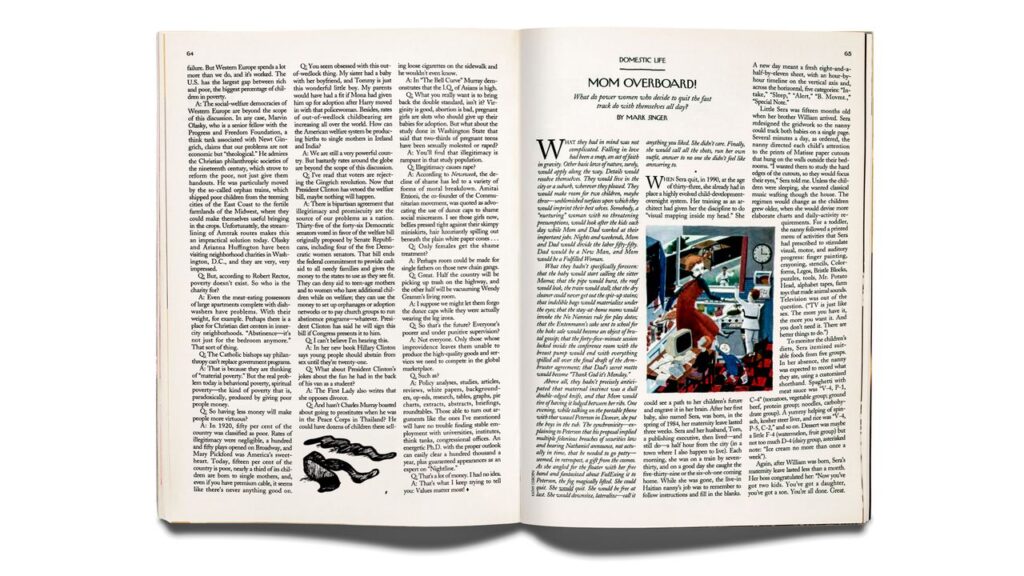There are plenty of old magazine stories I love, but I also love old magazines themselves. They’re time capsules, perfectly preserved and bristling with ephemera. The listings, the reviews, the ads—when I page through the double issue of The New Yorker published in February, 1996, this is the stuff that conjures a period I just barely remember absorbing as a preteen reader. There are a lot of ads, too; the issue is thick with them. After all, this is the “Women’s Issue,” and someone always has something to sell to women.
Such theme issues were a New Yorker staple between 1992 and 1998, when the magazine was edited by Tina Brown. Part of the pleasure of the cover-to-cover print experience is seeing a specific editorial perspective in all its obsessions and idiosyncrasies, and the Women’s Issue is rife with Brown’s. Her guiding principle, the high-low mix, is in full effect: Henry Louis Gates, Jr., on Hillary Clinton; Daphne Merkin on S & M. There are portraits by Annie Leibovitz and a meditation on Princess Diana. Even before publication, the issue generated a celebrity mini-scandal by recruiting Roseanne Barr as an editorial consultant, and the outcry receives a response in its pages. (“Media watchers,” the TV critic James Wolcott writes, are in “crisis mode,” imagining a “rumba between Eustace Tilley and a TV icon.”)
Threaded throughout is the question of women’s place in the working world. The subject receives its most direct treatment in “Mom Overboard!,” Mark Singer’s report on three women who left élite careers to stay home with their children. “What do power women who decide to quit the fast track do with themselves all day?” the display copy asks. Rarely does a reader receive a clear-cut answer to that sort of question, but Singer delivers. What do these women do? They go nuts, he adroitly explains.
Singer’s story has the elegant economy of short fiction. His central character is a former architect named Sera. Previously, she oversaw the construction of Manhattan office towers; now she oversees the meticulous cultivation of four children born in six years. “This is the way I approach any project,” she tells Singer. “I have children and I have to make sure that I do the best that I possibly can. How do I define ‘best’? When you go to bed totally exhausted and saying, ‘I couldn’t have done one more thing for them today.’ ” Sera’s story is interspersed with dispatches about Cathy, an “erstwhile luminary of the banking-law department” who bakes fifty dozen cookies in one Christmas season, and Carol, a lawyer turned “fiduciary for every child in the school district” who runs a subpar teacher out of town. Carol knows she’s nuts; she likes it. “I might be micro-managing your lives now and turning you into little axe murderers,” she informs her daughters. “But trust me, you’ll be happy axe murderers.”
In some ways, this is a story that’s been rewritten ad nauseam: a reporter zeroes in on some rarefied cohort that has given up on reconciling ambition and motherhood, then extrapolates an “opt-out revolution” or proof that women still can’t “have it all.” (From opting out follows Leaning In; from girlbosses, trad wives; and on and on.) Having absorbed these stories all my life without seeing their conclusions borne out, I appreciate that Singer makes no attempt to claim that “more and more” women resemble Sera, Carol, and Cathy. They’re not avatars of a dubious trend; they’re psychological case studies, too vivid and human to serve such an argument.
Brown, when the Women’s Issue came out, was raising two young children, and in her diary from her prior editorship, at Vanity Fair, she calls moving between work and family “so damn tough.” At The New Yorker, she wrote recently on Substack, “it was full on, all the time.” She describes the magazine’s “matriarchy” of editors: “They all had children themselves. We colluded like a secret society. . . . I still remember their nannies’ names.”
There’s a sense of adrenaline in Brown’s half-nostalgic reminiscence that defies mommy-wars fatalism, and it comes through in the Women’s Issue. “The idea that I might neglect a child had me waking at night in horror,” Mairi MacInnes writes, in an essay about parenthood and poetry. A few pages away, Sera makes an almost identical admission: “Sometimes I wake up at night and have an anxiety attack—that I’ve forgotten about this or that part of my child’s brain.”
Even Sera! So why should the rest of us lose sleep? Singer’s power moms deliver the issue’s punch line. ♦
Premium IPTV Experience with line4k
Experience the ultimate entertainment with our premium IPTV service. Watch your favorite channels, movies, and sports events in stunning 4K quality. Enjoy seamless streaming with zero buffering and access to over 10,000+ channels worldwide.

















